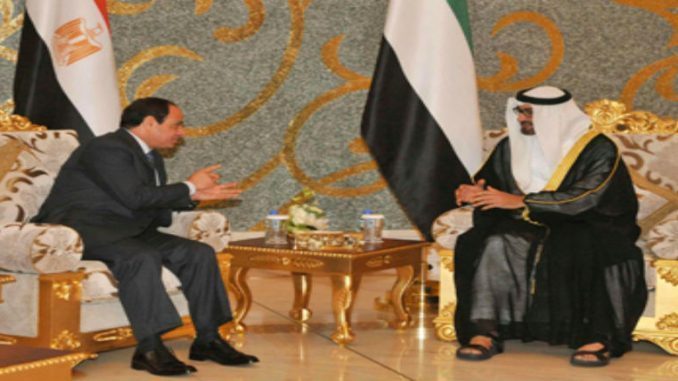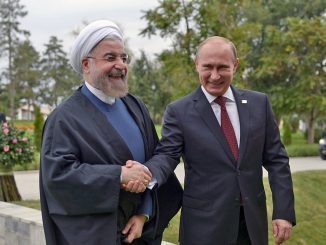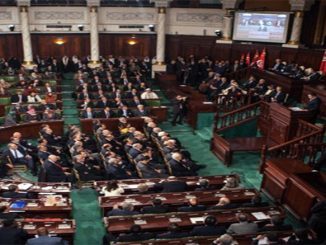
Al-Sisi is warming his relations with Gulf countries under U.S blessings. Weeks after U.S. Defense Secretary Jim Mattis’ visit to Egypt, al-Sisi started his Gulf tour amid Trump’s administration’s new agenda to renew its pact with US traditional allies in the region.
Prior to Mattis’ tour, the Pentagon stated that US defense secretary would meet with his counterparts in Saudi Arabia, Qatar and Egypt during his Middle East visit “to discuss strengthening security cooperation.”
The Pentagon also stated that during his tour, Mattis will aim “to re-affirm key US military alliances, to engage with strategic partners in the Middle East and Africa, and to discuss cooperative effort to counter destabilizing activities and defeat extremist terror organizations.”
In this context, Abdel Fattah al-Sisi has recently paid state visits to Saudi Arabia, the United Arab Emirates (UAE), Kuwait and Bahrain to refresh ties with the leading Gulf allies amid regional disorder in several Arab states including Syria, Libya and Yemen.
Re-fixing Relation with Saudi Arabia under U.S Auspices
Over the past year, ties between Egypt and Saudi Arabia have gone through ups and downs, mostly because of their different views on some regional issues particularly the situations in Syria and Yemen.
While Egypt sees that a political settlement in Syria is the best option, Saudi Arabia seeks removal of Syrian President Bashar al-Assad.
In addition, Egypt is not so much involved in the Saudi-led military campaign against Houthi rebels in Yemen but its naval forces are still protecting Red Sea’s Bab al-Mandab Strait to maintain national security.
After Saudi Arabia led Gulf support for Sisi’s post-Morsi administration with billions of U.S. dollars and tons of oil supplies, Aramco, a Saudi national oil company,relations soared when Egypt voted in favor of a Russian-drafted UN Security Council resolution on Syria that Saudi Arabia strongly opposed.
In response, Aramco suspended the delivery shipments of petroleum products to Egypt last October.
But signs of reconciliation appeared recently between both countries when Aramco resumed in early April its delivery of oil shipments to Egypt after six months of suspension.
Moreover, Al-Sisi met King Salman in his first visit to the kingdom since tensions that erupted over diverging policies on Syria.
The New Arab cited an Egyptian diplomatic source who said that US President Donald Trump was the “driving force” behind Egypt and Saudi Arabia’s recent reconciliation after months of tensions.
The Trump administration has reportedly pressed for the reconciliation between the two countries in a bid to curb Russian influence in the Middle East, while Egypt’s Abdel Fattah al-Sisi has been seeking to improve relations with Washington after a “dry spell”under the previous administration.
“Trump has played a major role in Cairo and Riyadh converging views on Syria, which had been the ‘crux of the rift’ between the two countries,”the source, who spoke on the condition of anonymity, said.
“Both of them have agreed to the plan that US Secretary of State Rex Tillerson proposed to Russia to solve the Syrian conflict,” said the source.
He added,”They have agreed to something of an honor code, which regards Iran as a threat to the Arab world and stresses the need to confront it by all means possible with Cairo backing Riyadh in this regard.”
The source added that during the previous meeting between the leaders at an Arab League summit last month they agreed on the importance of quickly ending the Yemen conflict “in a way that does not leave Riyadh looking defeated.”
In the same context, Motaz Salama, researcher and head of the Gulf Studies Unit at Cairo-based Al-Ahram Center for Political and Strategic Studies said that the structure of Egypt-Gulf ties is strong despite some hardships, noting that “the future of Arab national security” was one of the focal topics of discussion during Sisi’s visits.
He said, “I believe there is a development in the Egyptian understanding of the concerns of Gulf states over Iranian regional expansion that poses a threat to their political stability. This is a positive aspect in the Egyptian-Gulf ties.”
For his part, Hassan Nafaa, a political science professor at Cairo University, argued that the Gulf states care about keeping Egypt away from Iran, noting there is now some understanding between Egypt and Saudi Arabia because of the active Emirati role to overcome their differences.
“This will surely keep the distance between Egypt and Iran or at least prevent their approach that was apparent on the horizon,” Nafaa explained.
Nafaa also said that Donald Trump’s election to the White House boost interaction between Egypt and Saudi Arabia and the U.S. president must have urged both to overcome their rift amid his effort to integrate Israel in the region and achieve an Israeli-Saudi closeness to face Iran.
The professor sees that the United States seeks an Egyptian-Saudi approach and even an Egyptian-Turkish approach to establish a Muslim Sunni axis supported by Israel in confrontation of Iran, but he said it would not be that easy given the complicated situation in the Middle East.
“I believe that the developments in Syria will be the basic indicator of what the regional events will be like in the near future,” said Nafaa.
This clearly explains what has been written before in the Times about Trump’s new agenda to work on establishing an Arab Sunni alliance from U.S traditional client states in the Middle East against Iran.
The Time even wrote that, “There has been talk of deeper U.S. involvement in the Saudi-led coalition’s fight against Shiite rebels in Yemen, with Egypt possibly being urged to contribute forces.”
UAE and the Libyan File
Al-Sisi’s second Gulf trip was to the United Arab Emirates (UAE) for political and bilateral talks with Emirati leaders.
According to the presidency spokesperson, Alaa Youssef, Al-Sisi’s visit to the UAE comes within the framework of close brotherly relations between the two countries and their interest to continue coordination on ways to deal with the challenges the Arab world faces, while promoting joint action to protect Arab national security.
The last visit to Abdel Fattah al-Sisi to the UAE was in December when he attended UAE 45th National Day, during which he met with Crown Prince Sheikh Mohammed Bin Zayed Al-Nahyan.
Al-Sisi’s meeting focused on strengthening bilateral relations with the UAE through increasing investments and economic cooperation.
Over the past three years, the UAE has offered great support to Egypt’s economy, while also backing it politically.
However, al-Sisi’s visit to UAE mainly focused on discussing certain regional issues, especially the Libyan crisis.
Researcher Moataz Salama, said “Sisi’s tour came in the framework of continuous consultation between Egypt and the UAE on strategic issues.”
While Egypt seeks a settlement in chaotic neighboring Libya to maintain the security of the Egyptian western border areas amid growing terrorism and security challenges, the UAE has recently hosted a rare meeting between Libyan national army chief Khalifa Haftar and head of Libya’s unity government Fayez Serraj, the two key rival figures in the country.
In the same context, Hassan Nafaa said, “I believe that Abu Dhabi tries to play a role in some key Arab issues and it was not a coincidence that it hosted such a high-profile Libyan meeting, which is an important development because the Libyan issue is extremely important to Egypt.”
In fact, some media outlets revealed that Al-Sisi has probably met in UAE General Khalifa Haftar and Fayez al-Serraj, the chairperson of the Presidential Council of Libya, who held talks in Abu Dhabi under the mediation of the UAE.
In the same context, this week, armed forces chief of staff Mahmoud Hegazy met with UN special envoy to Libya Martin Kobler as they reviewed and exchanged views regarding updates in Libya. The meeting was part of efforts to reach political concord in Libya.
Al-Sisi previously met Haftar on the sidelines of the Arab summit that took place in March in Jordan.
Furthermore, media outlets reported that Haftar and al-Serraj will have another meeting to continue their discussions this week in Cairo and that it will be attended by al-Sisi.
Egypt has been playing a main role in the Libyan crisis as it has started several initiatives to end the ongoing political and military conflict.
In February, Egypt tried to hold a meeting between the two rival Libyan leaders in Cairo but it failed when Haftar refused to meet Serraj.
Al-Sisi’s in Kuwait and Bahrain for Economic Support and Joint Security Cooperation
In the framework of enhancing relations with Gulf countries, al-Sisi ended his Gulf tour by visiting Kuwait and al-Bahrain.
In Kuwait and Bahrain, talks focused on a number of regional and international issues of common concern, the need to strengthen joint efforts to counter-terrorism and the concerted efforts of the international community to reach political solutions to the crises witnessed by some countries in the region;including the Palestinian conflict and the situations in Libya, Syria, Iraq and Yemen.
Moreover, talks focused on enhancing the economic relations between both countries. Egypt’s Minister of Trade and Industry Tarek Qabil said that al- Sisi’s visit to Kuwait and Bahrain is an important step towards achieving a qualitative leap in joint economic relations with the two countries.
In addition, in Bahrain, Egyptian Ambassador to Bahrain Suha Ibrahim al-Far said that al-Sisi’s visit, “represents an opportunity for business interests on both sides in light of Bahrain’s recent development experiences and the country’s 2030 economic plan”.
The “Gulf National Security”: the key Message of Al-Sisi’s Visit
“The National Security of the Gulf States” was repetitive phrase at all of al-Sisi’s tour in the four Gulf states.
Al-Sisi has repeatedly said that the security of the Gulf states is also the security of Egypt, stressing that Egypt will not allow threats to the stability and security of its “brother countries in the Gulf.”
In fact, this was the key message to al-Sisi’s latest tour that is obviously based on new U.S administration’s vision in the region.
There is no doubt that the tour included economic negotiations, however the political dimension of this tour was more important as al-Sisi worked on ensuring that Egypt will be supporting the stability of the Arab Gulf region.
In this context, Al-Sisi’s Gulf tour aimed to send this message to the Gulf Sates that his country will defend their national security within the framework of U.S new administration to revive back the traditional Sunni Axis against Iran’s threat from one side, and the other challenges in the region as counter-terrorism.
In return, Al-Sisi would benefit from the Gulf economic financial support that would help Egypt revive back its economy, especially that the U.S is working on reducing the economic aid to Egypt to by half.
Accordingly, reviving the Egyptian Gulf relations will guarantee the continuous flow of financial support to al-Sisi regime even after the economic aid is cut off.
This week sources in Washington predicted that the US administration would reduce its economic aid to Egypt by half, registering $75 million instead of $150 million annually, while US military aid will stay at the same level, amounting to $1.3 billion.
On the sidelines of the door-knocking delegation in Washington, sources said that the reduction in US aid has nothing to do with the Egyptian-American political relation.
They also noted that there is a US trend to decline its aid to all countries, especially after the reduction of the US state department’s financial allocations by 29%.



